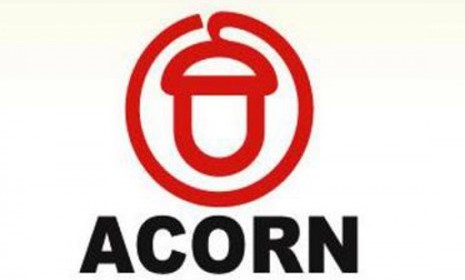The fall of ACORN: A timeline
Scandal-plagued community organizing group ACORN has confirmed it will dissolve after 40 years of operations. A brief history of ACORN's rise and fall

A free daily email with the biggest news stories of the day – and the best features from TheWeek.com
You are now subscribed
Your newsletter sign-up was successful
Scandal-plagued community group ACORN is formally disbanding. It will reportedly reorganise all of its local and state chapters as independent, non-affiliated organizations. ACORN, already facing intense criticism over voter-registration fraud allegations, imploded after conservative activists, posing as a pimp and a prostitute, last year secretly videotaped organization employees giving advice on evading taxes and setting up a brothel. Here, a quick timeline of the rise and fall of ACORN:
ACORN is founded, 1970
Wade Rathke, a 22-year old community organizer and recent Williams College graduate, forms Arkansas Community Organizations for Reform Now, or ACORN. Rathke had been sent to Little Rock as an organizer for the National Welfare Rights Organization. His new group's first focus is helping the poor obtain food and clothing.
The Week
Escape your echo chamber. Get the facts behind the news, plus analysis from multiple perspectives.

Sign up for The Week's Free Newsletters
From our morning news briefing to a weekly Good News Newsletter, get the best of The Week delivered directly to your inbox.
From our morning news briefing to a weekly Good News Newsletter, get the best of The Week delivered directly to your inbox.
ACORN gets political, 1972
ACORN first became involved in politics by endorsing two of its members who ran for the Little Rock School Board. Soon after, if opened its first office outside Arkansas, and began stepping into national politics.
The group goes national, 1980
While remaining focused on community organizing, ACORN wraps up a big expansion push, the 20/80 campaign, to put the group into 20 states by 1980. In the same year, ACORN made its debut in national politics by presenting its official positions on energy, health care, taxes, housing, community development, banking, jobs, and other issues to presidential candidates in both parties.
A free daily email with the biggest news stories of the day – and the best features from TheWeek.com
Civil disobedience, 1982
Thousands of ACORN members establish "Reagan Ranches" in 35 cities to protest then-president Ronald Reagan's massive military spending and reduced social spending. The activists set up one of the tent cities near the White House, despite attempts by the National Parks Service to break up the camp.
Housing for the poor, 1986
The group establishes the ACORN Housing Corporation, which, according to its website, has helped more than 45,000 families become first-time homeowners.
ACORN takes on the banks, 1992
ACORN holds a summit and gets big banks, including Continental, First Fidelity, and Mellon, to establish programs to help low- and moderate-income applicants qualify for mortgages. Citibank, the nation's largest bank, didn't participate, so ACORN activists protested at Citibank's Manhattan headquarters. Citibank agreed to a meeting.
Barack Obama, community organizer, 1992
Obama headed the Project Vote campaign in Chicago. The group, which was affiliated with ACORN, registered 150,000 voters and helped elect Carol Moseley Braun, the first black woman elected to the U.S. Senate. Obama later worked on a team of lawyers who represented ACORN when it sued Illinois for allegedly violating federal polling laws.
Voter registration fraud, 1998
A series of voter registration fraud accusations hit ACORN. In 1998, an Arkansas employee is arrested for falsifying voter registration forms. Shortly thereafter, Philadelphia authorities spot hundreds of registration papers they suspect were filled out by the same person.
The founder's brother gets in trouble, 1999
Dale Rathke, the brother of founder Wade Rathke, embezzles almost $1 million from ACORN and its affiliates over two years. The family finds out and agrees to put the money back, but doesn't tell ACORN's board or the police. Dale Rathke remains on ACORN's payroll until word gets out and he resigns in June 2008.
Fraud charges persist, 2004
ACORN -- which now stands for Association of Community Organizations for Reform Now -- claimed it registered more than 1 million new voters nationwide in 2004, a presidential election year. But authorities in Minnesota, Ohio, Florida, and other states suspect that some ACORN workers filed phony papers.
Conservative outrage builds as fraud charges mount, 2008
During the 2008 presidential campaign, ACORN collected more than 1.3 million voter registrations in 21 states. About 400,000 are rejected as incomplete, duplicated or fraudulent.
Criminal charges, 2009
The state of Nevada files criminal charges against ACORN, saying its leaders illegally paid workers to register voters.
The video sting, September 2009
ACORN's troubles spin out of control after independent filmmaker James O'Keefe and conservative activist Hannah Giles pose as a pimp and a prostitute and secretly videotape workers in several ACORN offices giving them advice on dodging taxes and establishing a brothel with underage girls. Congress strips ACORN of millions in federal funding.
Conservative opposition builds, November 2009
Fifty-two percent of Republicans polled by Public Policy Polling say they believe ACORN stole the presidential election for Barack Obama.
ACORN faces rumours of its closure, February 2010
A source close to ACORN says the organization is dissolving at the national level so that its local parts can survive on their own, many with new names. But ACORN spokesman Kevin Whelan says that the group remains intact, although it has lost some major chapters. "It is not true that ACORN is closed for business all across the country," Whelan says. "It still exists."
The end of ACORN, March 2010
ACORN announces it will formally disband on April 1. Although "falling revenues" are officially blamed for the move, the group claims it has faced a "series of well-orchestrated, relentless, well-funded right wing attacks." Much of the grassroots group's work is reportedly being carried on by newly-formed, unaffiliated organizations.